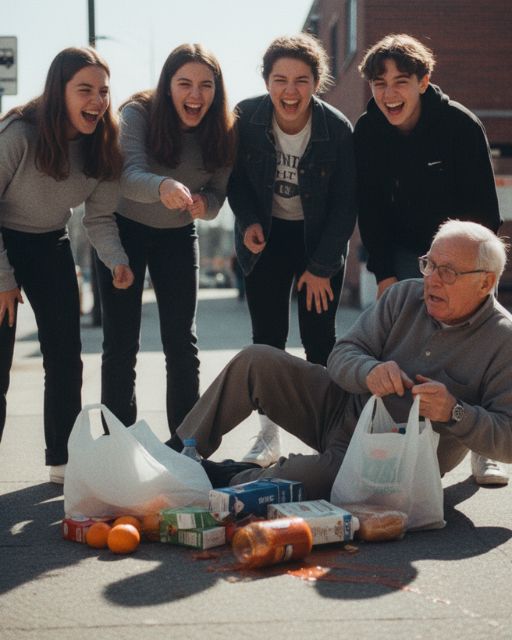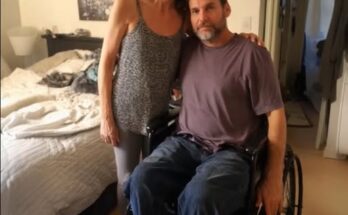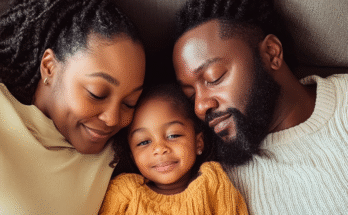I almost didn’t even stop at that bus stop that day. I’d missed my usual ride and decided to take the long way across town. That’s when I noticed him—an elderly man, steady but burdened by grocery bags. I nearly offered help. Almost.
Then—he tripped.
Groceries scattered into the street. A bottle of juice shattered, red liquid pooling on the concrete. His body hit the pavement with a sickening thud that made my throat tighten. But what shook me wasn’t the fall.
It was the laughter.
Four teenagers—perhaps seventeen—stood a few feet away, watching the scene like it was a comedy sketch. A girl giggled, bent over, slapping her knee. A boy pointed, smirking as if the old man’s pain was entertainment.
And me? I froze.
Seconds passed. I didn’t move. I didn’t speak.
Until something inside me snapped.
I walked toward them. Almost on instinct. Not thinking.
One of the girls met my gaze with a smug smirk. “What the hell is wrong with you?” I blurted out, louder than I meant to.
Their laughter died. The boy’s finger dropped. “Relax, it’s just a fall,” he shrugged.
“A fall?” I echoed, rage simmering. “That man could’ve been seriously hurt. He’s somebody’s father, maybe grandfather.”
They blinked, stunned. No one helped. The old man—Mr. Hampton—struggled to sit up, trying to retrieve his cane under a runaway apple.
I crouched beside him. “Sir, are you okay?” I asked, softly.
He nodded, wincing. “Embarrassed more than hurt.”
I gathered his fallen groceries, and a kind stranger joined me. Together, we rescued tomatoes and a flour bag from being crushed.
Once his shopping was secure, I offered to walk him home. He hesitated, then nodded. Mr. Hampton lived just three blocks away in a quaint brick house with wind chimes and a sunlit cat.
“I don’t usually need help,” he murmured.
“I know,” I said. “But sometimes we all do.”
I could still see the smug teens behind me—especially their laughter, their careless faces. I couldn’t unsee it.
That evening, I posted about what happened in our local online community—not naming names, just pointing out what had gone wrong. The response blew up: hundreds of supportive comments, outrage, empathy.
Someone typed, “This is what happens when kids aren’t taught empathy.” Another asked, “Where are the parents?”
It hit me: I work in a library around teenagers every day. Most are decent. These kids didn’t emerge from nowhere—and if no one shows them a different way… who will?
The next day, I proposed a new idea to my manager: an event—something authentic, something real. She agreed.
Within a week, flyers went up: “Open Mic – Real Stories That Changed Me.”
Event night came. A handful of teens showed up—some regulars, some new faces, and yes… one was the boy who pointed and laughed that day. I recognized him; he didn’t know me. Perfect.
I shared my story—no names, just the fall, the laughter, the choice to step in.
Silence followed. Then a girl with pink braids spoke:
“I laughed once when someone tripped. She cried—and I laughed. I felt awful later. I don’t know why I did it.”
Another teen followed—regret, honesty. Some cried. Some forced smiles. All of them listened.
Including him: Sam, I’d later learn.
He didn’t speak much at first. But week after week, he came back. On the fifth week, he stayed behind.
“That old man,” he whispered. “I was there. I… I laughed.”
“Why?” I asked gently.
He looked down. “It felt easier. Easier than helping.”
That sentence burned in me.
He started volunteering—shelving books, helping older visitors with tech, running kids’ events—quietly, without seeking praise.
Then one Saturday, Mr. Hampton appeared in the library. I nearly spilled my coffee.
“That old man you talked about,” Sam said, voice small. “I’m sorry.”
Mr. Hampton nodded slowly. “Takes guts to say that. Most won’t.”
Weeks later, I passed the old bus stop. The same teens stood nearby—but this time, they were giving out water bottles to people waiting at a shelter. One held a sign: “Need a smile? We got one.”
My heart clenched. Because kindness can be contagious.
“People fall. We help. Right?” one of them said, spotting me.
I nodded, my heart full.
The open mic became “Truth Talks,” a weekly safe space. Local teachers encouraged kids to attend. We even secured a grant to make it a youth outreach hub.
At graduation, Sam gave an unexpected speech—about kindness, about showing up when it’s not easy. He never mentioned the fall. But I saw his eyes.
A year later, I was back at the bus stop in light rain when a woman slipped. Before I could lift a finger, three teens rushed to help—no laughter. The newly kind world they’d helped build.
Sometimes, all it takes is one voice. One person saying, “What the hell is wrong with you?”
Be brave. Be the spark.



